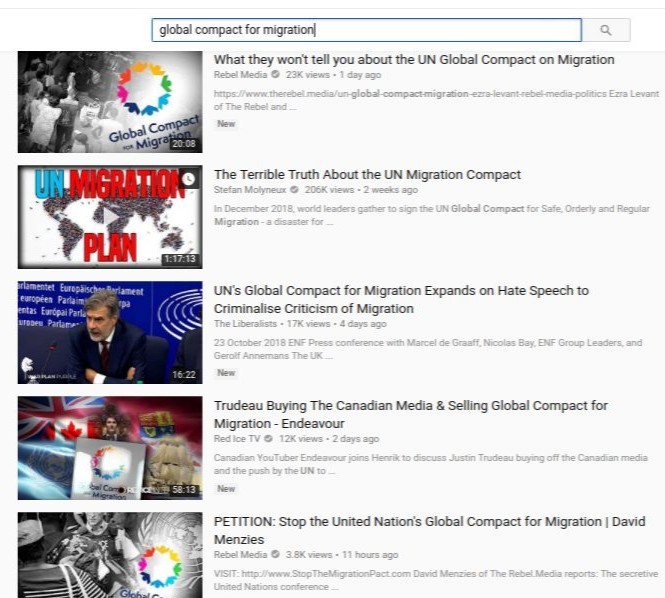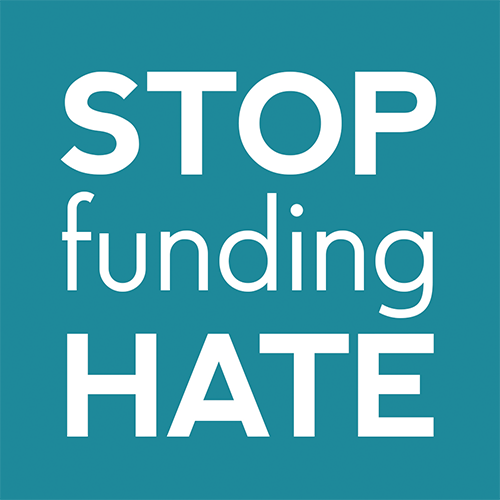This is a huge win for Stop Funding Hate supporters – and for the wider global movement challenging hate through consumer engagement with advertisers. Here’s why:
1. Stop Funding Hate supporters helped to make this happen
In 2017, the United Nations contacted Stop Funding Hate after seeing the huge response to our campaign. They invited us to Geneva to address a meeting of UN member states developing the new Global Compact for Migration. We were asked to put forward ideas for practical steps that governments could take to push back against the worldwide rise in xenophobia.
We highlighted the huge public concern about media racism not just in the UK but worldwide, as shown by campaigns such as Sleeping Giants. We argued that a new approach to advertising could help “make hate unprofitable”: If enough companies commit to ensuring that they don’t advertise with publications that incite hatred, then this will eliminate the financial incentives fuelling media xenophobia worldwide.
Stop Funding Hate suggested that:
UN Member States can lead by example by publicly committing to the principle of ethical advertising – and ensuring that any government advertising campaigns are not channelled through media that have a track record of inciting hatred.
That recommendation was accepted. This week, 152 countries voted to back the UN Global Compact for migration, which endorses:
…investing in ethical reporting standards and advertising, and stopping allocation of public funding or material support to media outlets that systematically promote intolerance, xenophobia, racism and other forms of discrimination towards migrants, in full respect for the freedom of the media.
In just two years we’ve gone from being a small group of volunteers to a movement of hundreds of thousands which has influenced the make-up of a new international agreement.
2. The United Nations has recognised that advertising is part of the solution to racism and xenophobia
Many global brands already have ethics policies to protect human rights – for example by ensuring that they don’t buy from factories that use child labour. But until recently very few would apply a similar ethical check to their advertising.
Stop Funding Hate has seen some significant changes in the UK press since a string of advertisers walked away from the Sun, Daily Mail and Daily Express. But we’ve always known that to bring about sustained long-term improvements, there needs to be a much bigger change of mindset in the way that companies think about their advertising.
The new UN Global Compact for Migration will contribute to that change of mindset. This is a major step towards establishing “ethical advertising” as a mainstream business ethics issue.
3. This could slash funding for extremist media worldwide – and help turn the tide against hate
Last year the world spent over £400 billion on advertising. If governments begin to apply the principles outlined in the Global Compact for Migration, and if big brands follow suit, this could slash funding for extremist media outlets and websites across the globe.
Hateful messages tend to work well as “clickbait”. So the growth of internet advertising has incentivised a global boom in online hate speech, conspiracy theories, and fake news. And as print sales fall, some traditional media have been publishing more extreme content in an effort to keep up.
But if big advertisers start systematically avoiding media outlets that fuel hatred, we could reach a tipping point, where publishing hateful clickbait becomes unprofitable.
4. The new UN agreement lays to rest some myths about freedom of speech
Newspapers like the Sun, Daily Mail and Daily Express are not normally noted for their sturdy commitment to human rights. In fact, both the Sun and Express have been called out by the United Nations High Commissioner for Human Rights over their hostility towards migrants, while the Daily Mail has been similarly highlighted by the United Nations High Commission for Refugees.
Yet the success of Stop Funding Hate has prompted a panicked response from some newspapers. The Mail, Sun, and Express have tried to persuade the world that asking advertisers not to give them money is an attack on a fundamental human right, the right to free speech. A similar complaint has been made against the Sleeping Giants campaign by Breitbart, Fox News and other media they have challenged.
Stop Funding Hate bases its campaign on the international human rights framework, which the United Nations oversees. Free speech is a core principle within that system. And despite the Daily Mail’s protestations, there is nothing in the Universal Declaration of Human Rights to prevent consumers politely asking the companies they shop with not to fund hate.
Nevertheless, one Sun columnist has gone so far as to claim that Stop Funding Hate is “attacking the very basis of our democracy”, telling readers “It is deeply disturbing to learn that this campaign is beginning to have an effect (the article also claims, incorrectly, that Stop Funding Hate has called for a boycott of advertisers). This was surprising because at the time, that columnist was also working as the UK’s Foreign Secretary. He was, in effect, speaking on behalf of the British Government.
Just a year later, Britain is one of 152 countries that has backed an agreement endorsing:
…stopping allocation of public funding or material support to media outlets that systematically promote intolerance, xenophobia, racism and other forms of discrimination towards migrants, in full respect for the freedom of the media.
By referencing media freedom, the Global Compact for Migration confirms that there is no contradiction here: We can fully support the principle of a free press without this obliging us to give money to media that fuel hatred and discrimination.
Article 19, one of the world’s leading organisations campaigning for freedom of speech, has also backed this position. In a statement urging governments to support the new agreement, Article 19 has hailed the Global Compact for Migration as “positive for ensuring free expression, access to information, and inclusive public debate”.
Together we’re winning this argument. The UK Government has not only strongly endorsed the Global Compact for Migration – they have spelled out that the agreement “does not curtail human rights, including media freedom or freedom of expression”. This may come as a blow to those who have tried to de-legitimise the British public’s right to challenge hate through peaceful consumer engagement with advertisers.
5. This shows that the trolls don’t always win

In recent weeks there’s been a worldwide misinformation campaign by extremists seeking to persuade governments to pull out of the Global Compact for Migration. Opponents have claimed, falsely, that this non-binding agreement will make it a crime to criticise migration, or that it will prevent governments from controlling their borders.
Such messages have dominated social media debates about the Global Compact for Migration, and gained an airing in traditional media including the Daily Express and Fox News. Far-right activists across Europe also joined forces to publicly denounce the agreement.
Despite all of this, only 5 countries voted against the Global Compact for Migration at the UN General Assembly, while 152 voted in favour. Even Austria and Italy, who have far-right parties in government, ended up abstaining rather than actively opposing it.
It’s perhaps no surprise that an international agreement which endorses de-funding media outlets that fuel racism would face such an epic campaign of misinformation. Yet it’s also striking that in spite of all of the energy invested in trying to disrupt the Global Compact for Migration, UN member states nonetheless endorsed it overwhelmingly.
The far-right have been hugely effective in using social media to amplify their messages and create an inflated impression of their support.
Yet their failure to stop the Global Compact for Migration shows that the trolls don’t always win. Amid growing awareness about the ways social media can be manipulated, there may be room to hope that the influence of these kinds of misinformation campaigns could soon begin to wane.
What next?
If you’d like to help build on this success, and continue Stop Funding Hate’s work with the United Nations advocating a “fair trade model for advertising”, please donate to our work here.
In 2019, Stop Funding Hate will work to persuade as many companies as possible to align with the principles outlined in the Global Compact for Migration, by applying an ethical check to their advertising. We’ll also be stepping up our efforts to challenge hate speech and disinformation on social media.
A huge thanks to everyone who has supported Stop Funding Hate over the past two years and helped to make this happen!
